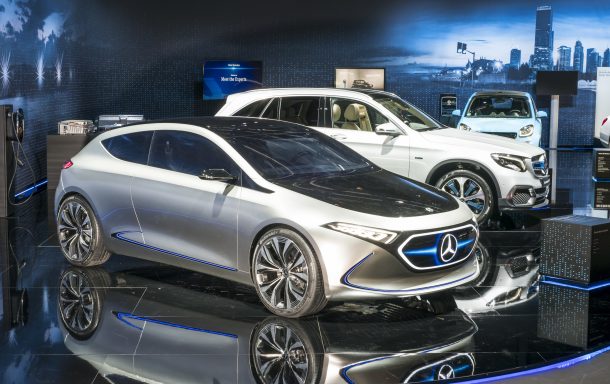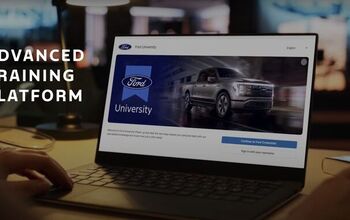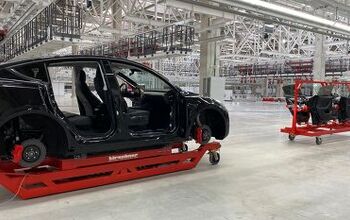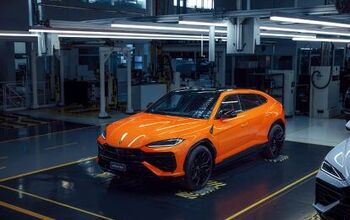Mercedes-Benz Building Compact EV for Global Market as EQ 'Brand' Grows Murkier

Daimler AG has announced an investment of 500 million euros ($589 million) for its plant in Hambach, France, to start production on a compact electric car for the Mercedes-Benz EQ brand. Known as “Smartville,” the complex was purpose built in the 1990s to supply the automaker with the first batch of Smart ForTwos and has been humming along ever since.
While numerous outlets have billed the model as a “Tesla fighter,” the rumor mill claims this vehicle is quite a bit smaller than the Model 3. That sounds reasonable enough, considering the new model would be produced in the same facility as the electric ForTwo and cabrio. However, the multi-million dollar investment will presumably go toward expanding the factory and procuring the EQ its own assembly line. We’ve heard nothing about the new Mercedes being a rebranded Smart vehicle.
There are actually a lot of gray areas to navigate here. While Mercedes spent a lot of time billing EQ as an electrified subsidiary, it’s already tacking the name onto electric Smart cars. The nomenclature now seems intended for any Daimler model with an electric powertrain, plus cleverly styled concept vehicles. Spyshots of the EQC sport utility vehicle, Mercedes’ first official entry into its broader EV effort, show the heavily camouflaged vehicle looking very much like the standard GLC-Class — not the concept EQs we’ve seen in the past.
With the exception of the powertrain, we expect the pair to share enough components for you to need to take a reasonably close look to tell them apart. Technically, the company’s Electric Vehicle Architecture is new. But it’s also directly based off the existing Modular Rear Architecture that the GLC currently uses. Daimler will probably give the EQC a unique grille and maybe some special trim pieces.
If that’s the recipe EQ is adhering to, the compact headed for assembly in France could be an electric version of the A-Class. Since Mercedes-Benz Cars intends to launch more than ten electric vehicles by 2022, hitting every segment, it would assuredly offer something in that size eventually. However, Mercedes is only giving us the faintest of hints to help move that theory out of the realm of complete speculation.
“The Smart plant in Hambach will become a part of our global compact car production network with the lead plant in Rastatt, Germany,” Mercedes production chief Markus Schaefer told Automotive News in a statement from Friday.
Rastatt is responsible for GLA and A-Class assembly, lending a smattering of credence to the hypothesis that the compact EQ might share components. Daimler has also announced its intent to produce luxury EQ models at its factory in Sindelfingen, Germany, where it builds the S-Class.
Interesting.
[Images: Daimler AG]

A staunch consumer advocate tracking industry trends and regulation. Before joining TTAC, Matt spent a decade working for marketing and research firms based in NYC. Clients included several of the world’s largest automakers, global tire brands, and aftermarket part suppliers. Dissatisfied with the corporate world and resentful of having to wear suits everyday, he pivoted to writing about cars. Since then, that man has become an ardent supporter of the right-to-repair movement, been interviewed on the auto industry by national radio broadcasts, driven more rental cars than anyone ever should, participated in amateur rallying events, and received the requisite minimum training as sanctioned by the SCCA. Handy with a wrench, Matt grew up surrounded by Detroit auto workers and managed to get a pizza delivery job before he was legally eligible. He later found himself driving box trucks through Manhattan, guaranteeing future sympathy for actual truckers. He continues to conduct research pertaining to the automotive sector as an independent contractor and has since moved back to his native Michigan, closer to where the cars are born. A contrarian, Matt claims to prefer understeer — stating that front and all-wheel drive vehicles cater best to his driving style.
More by Matt Posky
Latest Car Reviews
Read moreLatest Product Reviews
Read moreRecent Comments
- Lou_BC Well, I'd be impressed if this was in a ZR2. LOL
- Lou_BC This is my shocked face 😲 Hope formatting doesn't fook this up LOL
- Lou_BC Junior? Would that be a Beta Romeo?
- Lou_BC Gotta fix that formatting problem. What a pile of bullsh!t. Are longer posts costing TTAC money? FOOK
- Lou_BC 1.Honda: 6,334,825 vehicles potentially affected2.Ford: 6,152,6143.Kia America: 3,110,4474.Chrysler: 2,732,3985.General Motors: 2,021,0336.Nissan North America: 1,804,4437.Mercedes-Benz USA: 478,1738.Volkswagen Group of America: 453,7639.BMW of North America: 340,24910.Daimler Trucks North America: 261,959



































Comments
Join the conversation
It makes sense to make the electric vehicles very similar to current conventional cars, but with subtle differences. They need to be normal, not uber-futuristic or radical. More smart-like cars would result in a flop. The intelligent design would be to create the largest, best, longest-range battery possible, then build the car around that. When your choice of vehicle is between a gas-powered car with 350 miles of range and an electric car with 375 miles of range, for about the same price, then customers will snap them up.